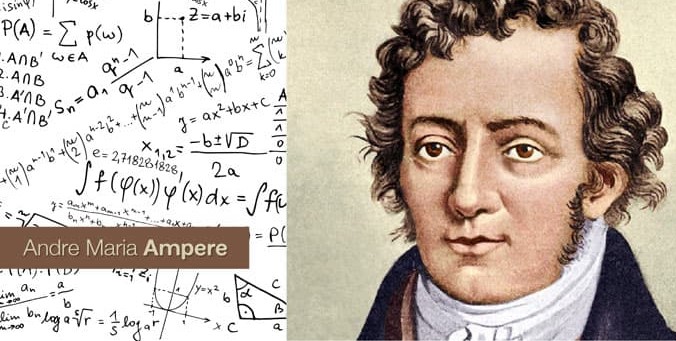He wrote his first scientific thesis at the age of 13: Who is Andre Ampere?
He was born as the first and only son of a wealthy and respected silk merchant. The boy had the luxury of learning according to the latest trends, he largely preferred what interests him, and he had a large family library at his disposal.

The beginning of 1775 was a very happy time for a bourgeois family in Lyon. On January 20, the first and only son of a wealthy and respected silk merchant was born. The boy had the luxury of learning according to the latest trends, he largely preferred what interests him, and he had a large family library at his disposal. He often read the Encyclopedia or the Systematic Dictionary of Sciences, Arts, and Crafts, thereby gaining a wealth of knowledge.
Andre Ampere was both eager to learn and very talented. He wrote his first scientific thesis at the age of 13. But at that time, dark clouds were hovering over France and his family. The outbreak of the revolution that shook Europe had dire effects on Ampere's fate, as his father supported the monarchy and eventually found himself on the gallows. The death of his father shook Andre Ampere deeply and he had to drop out of school for months.
André-Marie Ampère (20 January 1775 – 10 June 1836) was a French physicist and mathematician who was one of the founders of the science of classical electromagnetism, which he referred to as "electrodynamics". He is also the inventor of numerous applications, such as the solenoid (a term coined by him) and the electrical telegraph. As an autodidact, Ampère was a member of the French Academy of Sciences and professor at the École polytechnique and the Collège de France.
However, social changes and the loss of his previous status over time forced him to return to the scientific world. To support his wife and newborn son, Ampere began tutoring private math, physics, and chemistry and set up a home lab where he could develop his ideas. His work, "Reflections on Mathematical Game Theory", which gained a public appreciation and made the researcher famous, was very important for his career development. Although Ampere had no formal education, he managed to get a job as a lecturer in Lyon. Later, after the tragic death of his wife and moving to the capital, the scientist began teaching in Palaiseau and Paris. Napoleon later appointed him inspector general of the French university system.
He managed to build a career with numerous achievements and breakthroughs, especially in the field of electromagnetism, which also attracted the attention of Alessandro Volta at the time. He mathematically explained the relationship between electric and magnetic phenomena and formulated the famous Ampere's law, which is still used today. Interestingly, his claims were questioned by his contemporaries and their validity was confirmed much later. Ampere did not limit himself to just one area. During his career he developed an artificial language project; He also focused on philosophy and chemistry. He also developed an electromagnetic telegraph, developed over time by Carl Gauss and Wilhelm Weber. Despite so much merit and recognition, Ampere has not been able to achieve what we call happiness and fulfillment in life. The traumatic experiences of his youth and the early death of his wife left their mark on him. He sought solace in religion, but religion did not bring him peace. On his tombstone is the Latin inscription "Tandem Felix" (happy at last) that he wrote for himself.
Andre Ampere's achievements do not look groundbreaking today. If we think about it, it turns out that the discoveries of the French scientist have become the absolute basis with which we take for granted in our daily work. In this respect it is not surprising that Ampere is mentioned on many levels; He is among the 72 outstanding inventors whose names (like Charles-Augustin Coulomb) are engraved on the Eiffel Tower. The electrical current measurement unit bears his surname. International Electricians Day is celebrated on 10 June, the day of the death of the French scientist and physicist.
The electrical current measurement unit "ampere", determined in 1881, is named after him. Used by every electrician and electronics engineer; The familiar capital letter A can be found on any multimeter or fuse. Current measurement is the basis for calculating electricity consumption. The ampere unit is found in the documentation for passive elements, semiconductors, and electromechanical devices. However, Andre Ampere's work has focused primarily on the mathematical description of the phenomenon of electromagnetism, which is now widely used (for example, in motors). This shows how quickly Ampere saw electricity as an opportunity for the development of civilization.
